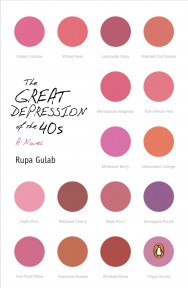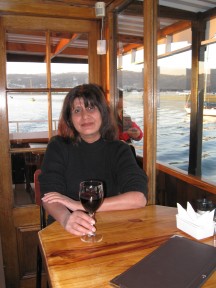 Some books live up to their authors. But very few authors live up to their books. In an industry packed with more ambition than talent, writers have unwillingly or enthusiastically embraced the fact that they and not just just their books have to be branded and marketed. At a time when writing is becoming a vanity exercise fuelled by the need to be visible rather than read and first time authors spend more time on PR exercises than at their writing desks, some one like Rupa Gulab is an anomaly. A refreshing one at that. She even resists having book launch events for her books and she has written three. Girl Alone, Chip of the Old Blockhead and The Great Depression Of The 40s.
Some books live up to their authors. But very few authors live up to their books. In an industry packed with more ambition than talent, writers have unwillingly or enthusiastically embraced the fact that they and not just just their books have to be branded and marketed. At a time when writing is becoming a vanity exercise fuelled by the need to be visible rather than read and first time authors spend more time on PR exercises than at their writing desks, some one like Rupa Gulab is an anomaly. A refreshing one at that. She even resists having book launch events for her books and she has written three. Girl Alone, Chip of the Old Blockhead and The Great Depression Of The 40s.
And the fact that her books, despite her complete disinterest in self -promotion have a following and have been translated in international languages, speaks for itself. I have a personal Rupa Gulab memory that I would like to share. When I was looking for a publishing breakthrough for my first book, I began to ask published authors whom I had interviewed as a journalist, for advice.
 Rupa Gulab, who I had spoken to just once over the phone for a quote, immediately connected me to her editor. No questions asked. Few authors ever do that.
Rupa Gulab, who I had spoken to just once over the phone for a quote, immediately connected me to her editor. No questions asked. Few authors ever do that.
Over the years, I have come to like her and respect her not just because of what she did for me but because her views about living and writing are honest and unsparing. She chuckles at even a whiff of self-importance even though I know for a fact that writing is not something she takes lightly.
Her writing style is like her. Honest, mercilessly witty and free of affectation. Her latest book The Great Depression of the 40s is about many things but primarily, the personal and professional dilemmas faced by women in their 40’s. Women who are not shaped by a cookie cutter but have minds of their own, lives that are real and challenging. I recently coaxed her to answer a few questions and she responded unwillingly. And it is clear from her answers that she is a writer who would rather write than talk about writing.
Your first memory as a writer?
When I was a teenager I wrote Nostracious Nominovich, a short story about a communist owl for my little sisters. They giggled so much, I was encouraged to send it to Target, a children’s magazine. That’s when I got my first rejection slip. The editor sent her warmest regards but firmly said that the story was too “westernised for Indian audiences.”I still have that rejection slip, by the way. It always makes me laugh.
First publishing breakthrough you got?
That was when I moved to Bombay (now Mumbai) in the eighties. While advertising was my day job, I used to freelance for a number of publications. I think I got my first byline in Eve’s Weekly for an article called Hostel Woes. I was pulled up by the grim hostel committee for that – they even threatened to throw me out for making fun of them. Thankfully, the scars on my knees from all that grovelling have finally faded.
What was the process leading up to your first book, Girl Alone, like?
Very cool, actually. Penguin reverted within a month, and the novel was published nine months later. The story was already in place since Girl Alone had been serialised in Cosmopolitan as Dating Diary for two years – I just changed a few things here and there for my own amusement.
A friend insisted on designing the cover and we had great fun deliberately creating a non-girlie cover: we eventually settled for bilious yellow!
Are you a disciplined writer or a compulsive one?
I used to be disciplined, but these days I write only when I feel an overpowering urge.
What kind of writing (by others), experiences stimulate you as a writer?
I think perhaps I’m schizophrenic because I enjoy humour (mainly satire) and dark, intense novels as well. But I can honestly say that nothing stimulates my creative urges as much as vodka does. Look, I don’t take myself seriously so I can’t answer searching questions like this!
What kind of stories do you want to tell?
The kind that makes people realise that life sucks but it’s much more enjoyable to laugh it off than weep bitterly and bore everyone around you. That’s my personal philosophy and I intend to spread it far and wide. Maybe someday I’ll start a new religion too, who knows?
What is the one thing that frustrates you about the writing/publishing industry in India?
I don’t spend time thinking about the publishing industry. I write because I feel like writing, period.
And tell us why you wrote The Great Depression of the 40s at this stage of your life? Was it progression from girl stories to a woman story?
Nope, I don’t work that way. Consider this: The protagonist of my first novel, Girl Alone, was in her twenties. The protagonist of my second novel, Chip of the Old Blockhead, was in her early teens. That doesn’t amount to regression, does it? I’m very comfortable writing for any age group. The plot for The Great Depression of the 40s accidentally popped into my head late one night. I rushed to the computer and poured out a few paragraphs. The next morning when I re-read it, I still felt excited about it and that was that.
Where do you want to go next as a writer? Are you onto a new idea?
I have two ideas but I’m waiting for grey rainy days to start pouring them out on paper. Sadly it seems to be a bad monsoon year (so far) so perhaps I won’t accomplish anything.
An excerpt from The Great Depression of the 40s (Courtesy Penguin)
(http://www.flipkart.com/books/014306780x)
While Vir was thinking affectionate thoughts about her, Mantra was at her bedroom window anxiously peering at the sky for signs of pre-monsoon showers. A couple of grey clouds drifted briskly past, but they were too wispy to provide even a drop of rain. The puffs of smoke from my cigarette are more robust, she thought scornfully, and got back to the book she was reading. To her horror she discovered that her eyesight had deteriorated further in the fifteen minutes she’d put the book aside. She had to squint desperately hard to read—a new reading lens prescription was called for. Mantra sighed. Why oh why can’t the point size in reading matter for adults be as gigantic as it is in children’s books? Children have better eyesight; it’s us decrepit old sods who can’t read! Oh I wish I could die before I grow older. I hate living!
When Vir returned, cheerfully humming a rugby song under his breath, he saw light under Mantra’s bedroom door and knocked gently. No response. He knocked harder and got a terse ‘What?’
‘The anniversary is coming up; what do you want?’ he asked in a spirit of bonhomie.
‘A bloody divorce, that’s what!’
Vir laughed good naturedly, and stumbled to his room. Mantra was a card!
It was just as well that the door had been shut and he hadn’t seen the grim determination in her eyes and her tightened lips. Mantra badly wanted that divorce. She cursed herself for not learning life lessons in history class: Napoleon and Hitler were both short. How incredibly stupid of her to have married a short man!
Reema Moudgil is the author of Perfect Eight (http://www.flipkart.com/b/books/perfect-eight-reema-moudgil-book-9380032870?affid=unboxedwri )






Delicious and sassy!
Can’t wait to read the book…sounds very interesting!
Looking forward to get my hands on the book now:)))sounds very interesting…Cheers to you guys:))) HIC